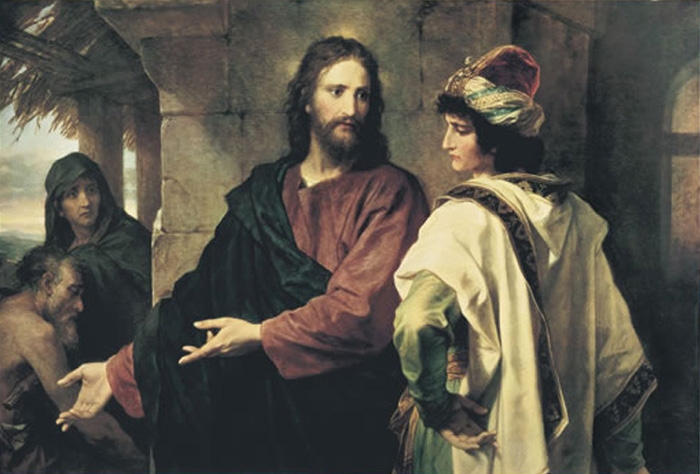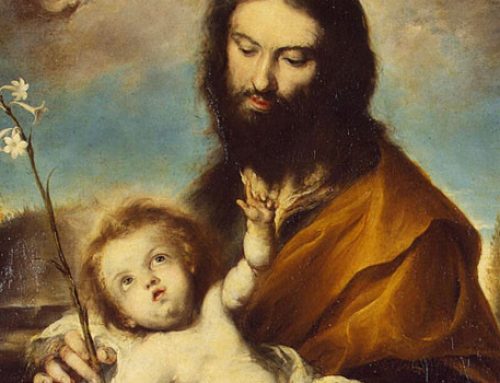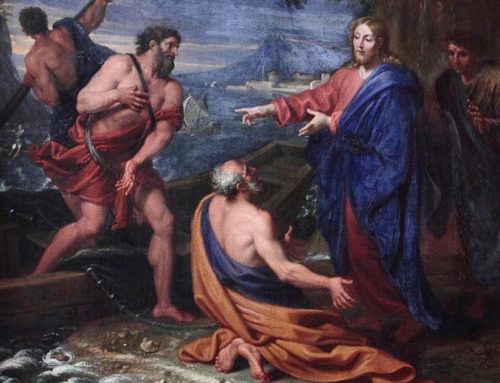How did the story of the rich young man continue?
Love, to be authentic, should cost us. (Madre Teresa of Calcuta)
The Teacher asked him to drop everything and follow him. But he refused, and was sad. There were others who followed him, and were great apostles, great saints. I suppose, over time, the news would arrive to the boy about the master. Some would say he was an impostor, others a miracle worker, and some a prophet. Later the news would come that he had been crucified.
We can imagine now, following at a glance José Miguel Cejas-that the character is an old man. He is sitting at sunset, in the hallway of his house. They have already completed work in the fields, and heard, in the distance, the boisterous laughter, and gleaners returning the shouts of the men carrying the last sheaves. He has a lost look, staring as faded into silence. Slowly the day is consumed, amid rumors of fatigue. And time continued carrying memories, as the wind carries the last traces of caravans in the parched road passing by his door.
He speaks little. Occasionally, they visit old acquaintances and together evoke friends and relatives, almost all already dead. They comment about the next harvest of the vineyards or olive trees. And while in the house, as usual: the noises of pitchers, screaming children, and young female footsteps. For years this old man has contemplated in silence impregnated with sadness, the games of the children of his children. He lives in nostalgia and memories surprisingly close despite the time. And there are some moments in his life that weigh on his soul like decades. And others that just never happen, like the profound look of some Rabbi.
Many years ago, more than sixty, he crossed Palestine with an old servant who died long ago. Then a young boy, he had the strength, not like now. He was rich and somewhat arrogant. Happy? Acceptably happy. And fearing God. So he ran out to meet this extraordinary man. He asked, “Good Teacher …”. And the Rabbi, looking into his eyes, smiling, inviting him to follow. But he refused. And it was sad.
Time passed. In the village contradictory things were discussed. Some said that the Rabbi was a liar and an impostor. Others talked of miracles. Others were convinced that he was a prophet.
Much time passed. He married and had children. News from Jerusalem was late to their village. One Passover they told him that he had been crucified. He took a deep breath. “I was right: it was nothing more than a visionary. I was right not to follow. What madness if I had thrown overboard all my goods. ”
But, without knowing why, the news saddened him, as that afternoon when he came back to the warm and friendly call of the Master. In his mind was fixed idea that the Lord had called him, and that if he wanted to follow him was not by selfishness, but that call, that vocation was still alive inside. He discovered that his old illusions, desires of God, were still there, in a fold of the soul. Because, for years, almost without warning, the look and the smile of Jesus had accompanied him.
One day the disciples of the Lord had appeared by their village, which created much tension, because the doctrine of Christ does not leave anyone indifferent. The elders discussed at the entrance of the village and raged against them in the synagogue. All were challenged by the teachings of that master, and perhaps the rich young man, who was no longer so young, thought back to dropping everything and joining the men, supporting the call now that the Master had made him a few years earlier.
Some had made their own. Other insulted and persecuted. Maybe then he was generous and regained time he had lost. But selfishness returned again to overcome him, and he preferred to stay comfortably apart. He was rich and did not want to risk. He would just look from afar at what was happening. He could have been one of them. And still richer. His house was filled with incense burners, carpets and the small luxuries of an oriental village. He had more and more servants, and reflecting his increasing fields.
And a few years later came that terrible war, the Roman invasion, and destruction of the Temple of Jerusalem. And the man surely lost everything. They seized from others what they would not give the Lord by their own will. Now his body was slowly warping and his wives face was shriveled. And in old age they would lament their poverty, seeing their fields and their cattle in another’s hand, seeing the disdain of those who flattered him before because he was rich, but now ignored him because he was not. And he was still there, like a sad dog in the doorway of his house, imagining what it could be and was not. All around, he saw the answer to what would have been his life: a life locked in his selfishness, now the other paid him with the same money. And he wept silently, thinking that perhaps his life could have been less comfortable but without that overwhelming bitterness of selfishness.
This man could have been a great apostle. He received, as John, the call in his youth. How many souls could have saved! Jesus saw them through his eyes. And seen behind these souls, so many others. But the man said no. His selfishness forever broke God’s plans. Why? The Gospel states that he had great wealth. We can imagine what it would be. At best, some fields, a few houses, a few horses, some mules … And for these miserable riches he forsook God made man, who sought him in the prime of his life. It is understood that Jesus did that painful reflection, and then commented that it is easier to pass a camel through the eye of a needle than to enter the kingdom of God they who are attached to their wealth.
This young man has remained anonymous. If he had responded positively to the invitation of Jesus, he would become his disciple and probably the Evangelists would have recorded his name. But whoever puts his trust in the riches of this world does not reach the full meaning of life and true joy. On the contrary, who trusts the word of God and self-denial and their property to seek the kingdom of heaven, apparently lose much, but actually win everything. The saint is precisely that man, that woman, who responds with joy and generosity to the call of Christ, leaves everything to follow him. As Peter and the other Apostles, and countless other saints, we must follow the path that God marks us, which is demanding but fills the heart and we will receive a hundredfold now in this life, together with trials and persecutions, and then eternal life.
Do you think then that God always asks us what it costs?
God does, and that is the nature of man. Nobody considers authentic a love that is not disposed to sacrifice. “Love, to be real, must cost us,” said Mother Teresa of Calcutta. And the sacrifice is the test of love and what really brings true joy. “I do not want you to give me, what is superfluous. I want you to give me what I need to really feel it. The other day I received fifteen dollars from a man who has been paralyzed for nearly twenty years. The paralysis only allowed him to use his right hand. The only company he tolerates is that of tobacco. He said, “Just a week ago I quit. I sent the money I saved from not buying cigarettes. “It must have been a terrible sacrifice for him. With that money I bought bread and gave it to people who were hungry. Thus, both the donor and those who received the donation experienced joy. “
“I think a person who is attached to his riches, who lives worried about their wealth, is actually very poor. However, if that person puts his money in the service of others, then he becomes rich, very rich. Kindness has converted more people than zeal, science or eloquence. Holiness increases faster when there is goodness. The world is lost for lack of gentleness and kindness. Do not forget that we need each other. “





Leave A Comment
You must be logged in to post a comment.